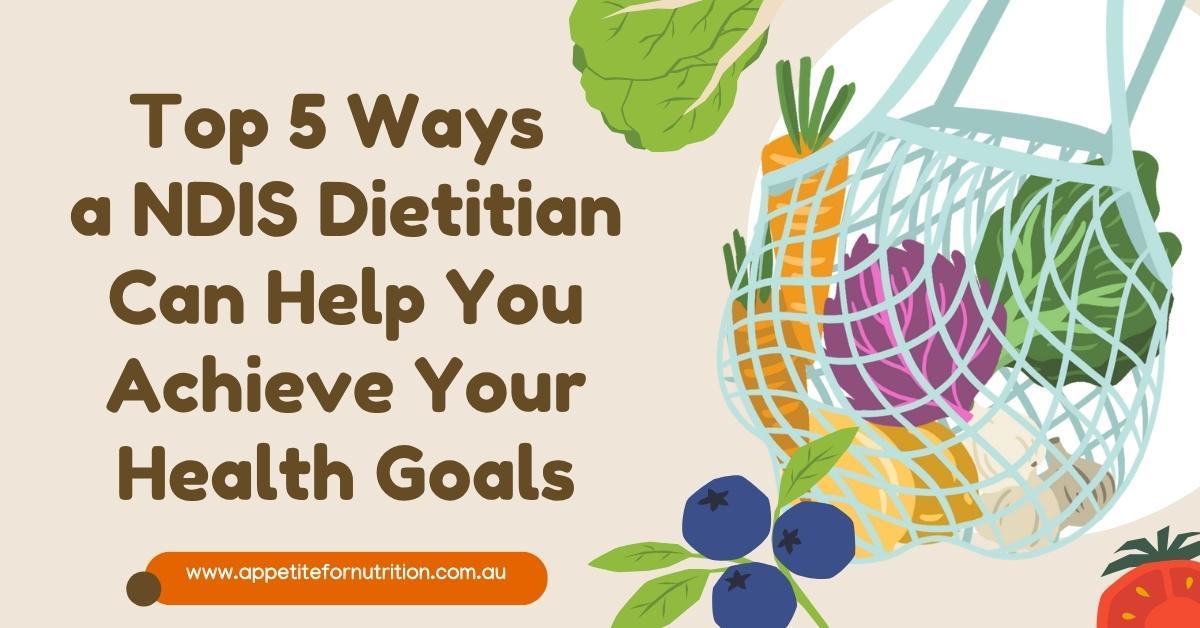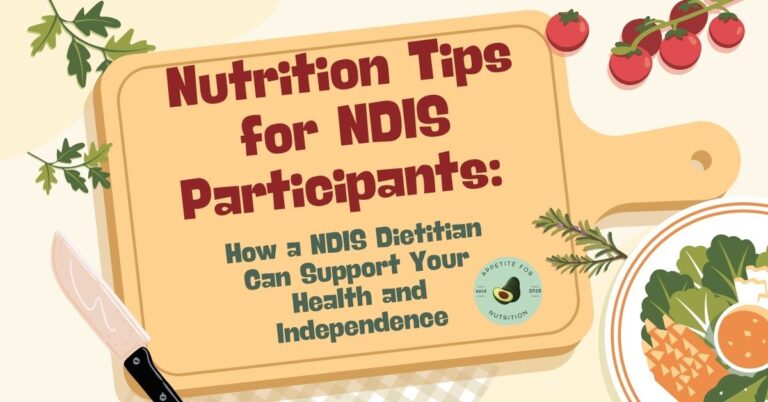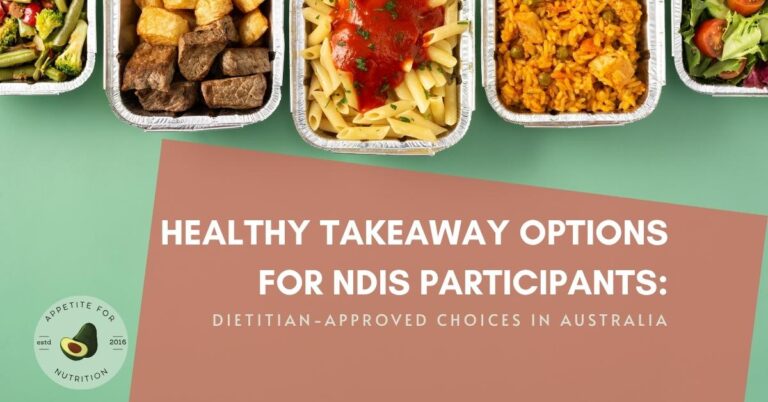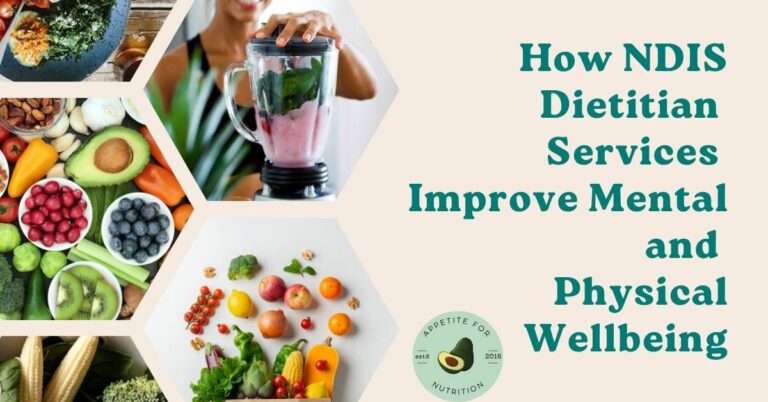
Top 5 Ways an NDIS Dietitian Can Help You Achieve Your Health Goals
Working towards your health goals can feel overwhelming when you’re also managing a disability, complex nutrition needs, or difficulties with eating and meal preparation.
That’s where an NDIS dietitian comes in — providing tailored, disability-specific nutrition support to help you live well, eat with confidence, and build independence.
Below are five key ways an NDIS-registered dietitian can support you in your journey to better health and quality of life.
1. Personalised Nutrition Plans for Your Needs
Every NDIS participant has unique goals, challenges, and abilities.
An NDIS dietitian designs an individualised nutrition plan that aligns with your specific disability, functional needs, and support goals — whether that’s improving energy, managing feeding difficulties, or building meal preparation skills.
For example:
Supporting someone with Autism Spectrum Disorder (ASD) who experiences sensory food aversions
Helping a participant with Cerebral Palsy achieve safe and comfortable eating
Assisting someone with limited mobility to access easy, nutritious meal options
Each plan is practical, flexible, and achievable within your NDIS goals.
2. Supporting Feeding, Swallowing, and Mealtime Difficulties
Feeding challenges are common among NDIS participants, especially those with neurological or developmental disabilities.
A dietitian collaborates closely with Speech Pathologists (SPs) and Occupational Therapists (OTs) to ensure safe and enjoyable eating experiences.
They can help with:
✅ Texture-modified diets (soft, minced, or pureed foods)
✅ Tube feeding (enteral nutrition) support
✅ Hydration strategies to prevent dehydration or choking risk
✅ Ensuring adequate nutrient intake for growth and energy
Learn more about how dietitians, OTs, and SPs work together in our article on collaborating for NDIS support.
3. Building Nutrition-Related Daily Living Skills
A major part of NDIS nutrition support is helping participants gain confidence and independence with food.
Your dietitian can help you (and your support workers) develop everyday skills, such as:
Planning and shopping for groceries
Reading food labels and budgeting
Preparing balanced meals safely
Managing portion sizes and food storage
These skills help build independence in meal preparation and decision-making — key goals for many NDIS participants.
Explore our healthy meal plans for ideas that fit a range of abilities and preferences.
4. Supporting Behavioural and Sensory Eating Challenges
Many individuals with disabilities — including autism, ADHD, and intellectual disability — experience sensory sensitivities or selective eating patterns.
An NDIS dietitian provides gentle, supportive strategies to gradually expand food variety while respecting sensory needs.
They may work alongside your OT or behaviour therapist to:
Introduce new foods in familiar environments
Address anxiety around textures or smells
Create structured mealtime routines
Reduce mealtime stress for both participants and carers
This collaborative approach helps make eating more enjoyable, predictable, and less overwhelming.
5. Enhancing Health and Participation
Good nutrition is essential for daily function, focus, and energy.
A dietitian can help you find the right balance to feel your best — supporting you to engage in community activities, therapy, or work goals with more confidence and stamina.
They can also provide guidance to carers and support workers so that nutritional needs are met consistently across different settings — at home, in supported accommodation, or day programs.
Wrapping Up
An NDIS dietitian plays a vital role in helping participants achieve their goals, improve daily living skills, and build a positive relationship with food.
Whether it’s navigating sensory feeding challenges, planning meals, or developing independence, their expertise helps you thrive — both physically and emotionally.
At Appetite for Nutrition, our NDIS-registered dietitians provide compassionate, goal-oriented nutrition support across Queensland and Victoria.
We offer both general nutrition consults and specialised disability nutrition support available online and in person across Brisbane, Gold Coast, Melbourne, Shepparton, Bendigo and Albury-Wodonga.
Contact Appetite for Nutrition today for individual consults or tailored meal plans designed to help you eat well and feel your best.
This blog was last updated October 2025.
Frequency Asked Questions
Our NDIS dietitians provide compassionate, evidence-based nutrition support for people with disabilities and chronic health conditions.
Yes. We’re a registered NDIS provider offering dietitian services for participants throughout Bendigo and central Victoria.
Dietitian sessions can be claimed under the following NDIS categories:
Improved Health & Wellbeing
Improved Daily Living
Assistance with Daily Life
Yes, we provide home visits within a 50 km radius of Bendigo, including Kangaroo Flat, Eaglehawk, and nearby towns.
Telehealth is also available for participants outside this area.
We currently have immediate availability, with most initial appointments offered within two weeks depending on client preference and location.
We support clients with autism, intellectual and physical disabilities, mental health conditions, and chronic illnesses.
Referrals can be submitted directly via our Referral Form. Support coordinators, GPs, or allied-health providers can also refer on a client’s behalf.
Yes. We prepare goal-aligned reports for NDIS reviews, plan renewals, and multidisciplinary updates to ensure clear communication between all members of the client’s support team.
Our team of NDIS dietitians covers Melbourne (North, West, South East, CBD), Bendigo, Shepparton, Albury, and Queensland (Brisbane and Gold Coast), with telehealth available Australia-wide.
Recovery looks different for everyone. Our dietitians provide ongoing, compassionate support — helping you restore health, rebuild trust with food, and move toward long-term recovery at your own pace.



